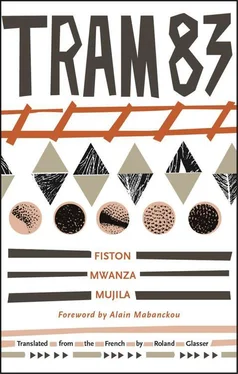Émilienne was waiting for Lucien. She saw someone confused by life. Lucien didn’t dare even hold her gaze. He was dirty, distressed, stubbly, worn out by his own destiny.
“Your stage-tale, I told you it interested me.”
“Not that piece. It’s still under construction.”
He placed his texts on the table. He thought, Porte de Clignancourt: “We’re working here while you have fun out there!”
He picked up his pen, wrote some long sentences before continuing …
Émilienne ordered two rums.
“So you mean to tell me you don’t have any writing to publish?”
“Tip …”
“Foreplay wows me.”
“I love myself and I love you.”
“I’ve got a beautiful body.”
“Come my sweet baby.”
Lucien rummaged through his texts and pulled out some pages bound together.
“Here, a version that’s a few months old.”
Ferdinand lit a cigarette.
“What was the title again?”
Lucien didn’t reply.
“Friday, same time, I’ll tell you what I think. Maybe I’ll bring the publishing contract with me.”
Lucien stood up.
“You don’t even thank me?”
Lucien walked toward the exit.
“Listen, Lucien …”
Émilienne left too, hot on his heels.
This was a girl apart, unbalanced. She was looking for true love. Lucien behaved courteously toward her. He was the man of her dreams, of that she was sure. And all the baby-chicks reproached her for it, since money was all that mattered to them.
Requiem liked to say that every human has two cables in their head: a blue and a yellow. If the blue cable is cut, the person goes mad. The Negus continued in this philosophical vein: “Three-quarters of humanity have already lost the blue cable.” His gaze swept the Tram, as he spelled out the names of tourists, waitresses, busgirls, diggers, mercenaries, and baby-chicks who no longer had the cable in question. The name of the Tram’s owner, of Lucien, of Émilienne, and of the busgirl with fat lips never failed to appear on his list.
Swinging rhythms, keyboards, clarinets, saxophones, drums, and electric guitars, a band come straight from Guadeloupe.
REQUIEM AND MALINGEAU, OR WHEN TWO CROOKS DRINK TO EACH OTHER’S HEALTH.
Tram 83, interior.
In the background, a saxophonist performing a solo.
Center-forward, the young ladies of Avignon in their vestal robes eyeing up all the masculine clients.
Left-back, the Chinese tourists.
Far-left, the Indo-European tourists.
Front door, the busgirl with fat lips and her colonial-infantry patter.
Leaning on the bar, Requiem and Ferdinand Malingeau.
“It’s been suggested that you’re chasing after me.”
“Maybe.”
“What do you want with me?”
“Stop raiding my henhouse.”
“You should go see a marabout.”
“I’ve heard you’d like to publish Lucien’s writings.”
“What’s that got to do with you?”
“I forbid it.”
“By what right?”
“I have no explanation to give you. It’s thanks to me that Lucien’s here in town. I used all of my influence to get the bastard out of that Back-Country cesspit. He’s under my guardianship and I won’t tell you twice.”
“My dear friend, you are quite mad.”
“But if you really want to publish his drivel, we could come to some arrangement. Do you know that Lucien has done me much wrong and that I am not ready to absolve him? As long as I live, I will strive to ridicule him, to belittle him, to destroy him.”
It was hardly a secret. Requiem held Lucien responsible for everything: the rout of the government forces, his father’s death, his mother’s swift remarriage, his divorce from Jacqueline.
“He took advantage of my absence to steal my wife. No, I shall battle Lucien until the end of the world. I pity you, Malingeau. If you really want to publish his writings, you must pay a five thousand dollar fee for authorization to publish. Otherwise …”
The publisher burst out laughing.”
“Listen, Malingeau …”
“Go get some sleep, Negus!”
The publisher drained his bottle and headed toward the young ladies of Avignon, leaving the Negus stranded.
The publisher was a regular of Tram 83. He came here nearly every day of the week and was treated like a prince. His reputation had grown the day the dissident General mentioned him in one of his interminable speeches. They’d attended the same high school in Geneva and knew each other personally. In 1978 they lost touch with each other, the General having changed schools. It was through the press that Malingeau picked up the trail of his former classmate. At the time, the dissident General’s name was on everyone’s lips and provided extensive copy for foreign newspapers.
Ferdinand Malingeau was one of those rare specimens, as his name suggests. Originally a nonprofit tourist, he was swept up by the ambience of Tram 83 and its bargirls. He held a master’s in theology, economics, and general agronomy, and had been a middle manager at a large bank in his native country. At least that’s what the gossip said. In a town erected solely upon guile, resourcefulness, Kalashnikovs, and the stone, it had become hard to discern the precise identity of the tourists. Which countries did they really hail from? Why had they come to Africa? What was their true motivation? Did they have wives and children? The fact remains that Malingeau, according to the grapevine, had given up everything to come feed off the soil of the City-State. He had initially hesitated between India and Tibet. Nearly all the nonprofit tourists were tired of the monotony and arrived with the hope of living in a world, a continent, as yet unpolluted by the excrement of globalization. He survived for three months without excavating. Which was a true miracle. As he himself said, he didn’t want to profit from Black Africa. His blunder was to start frequenting Tram 83. Life in Tram 83 is execrable if you’ve got no dough. The baby-chicks spurn you. The diggers spurn you. The waitresses and the busgirls spurn you. The Chinese tourists spurn you. The for-profit tourists spurn you. The musicians spurn you. The students spurn you. The mercenaries spurn you. The slim-jims spurn you. All the traders spurn you. In short, a pestilential solitude. Humiliation took on a different form, particularly in the case of a white tourist. It was for this reason, so the rumors insinuated, that he had decided to excavate, to obtain the wherewithal to satisfy the baby-chicks who pursued him, and thus penetrate the kingdom of the first-class tourists.
Those who’d run into him when he arrived in the City-State swell with pride when they speak of the man. Everyone recalls Malingeau’s irruption into their world. It was a Saturday night and the Tram was heaving as usual. The door opened and a dirty, scrawny, taciturn young man, with a face like that of a forlorn dog, entered the Tram, carrying nothing but a little suitcase. The Tram’s clients knew each other even if they didn’t always converse. It was immediately apparent that this was a newcomer.
He’d wandered about some before winding up at Tram 83, which, like all places of socializing, operated according to a hierarchy. Individuals banded together according to geographical origin, the language they spoke, but above all their pecuniary state: the for-profit tourists, the colored tourists, most of whom were poor, the white tourists, and, finally, the Chinese tourists, who refused to mix with the others and always moved around in a tight bunch, even in the mixed facilities. These castes displayed their own internal subdivisions, often hinging upon money and fairness of skin. Thus the terms “second-class tourists” or “second-rate tourists” embraced both the whites and the blacks who were stuck for cash. The publisher could not therefore directly court the for-profit tourists possessing excavation rights. It was through hanging out with the African tourists that he met the Negus. Thanks to Requiem’s contacts, the publisher was received by his former colleague, the dissident General, who granted him the authorization to excavate, as well as the key to a mine that had been abandoned in the aftermath of decolonization. Malingeau appointed the Negus director of the factory he’d just established. Requiem ripped him off over a period of two years. He either fiddled the factory’s successful tenders or else brokered potential ones to the for-profit tourists. Which annoyed Malingeau, who fired him after several warnings. The Negus never got over this, complaining to whomever it might concern: “It’s thanks to me he can even open his mouth. He was a zombie when he turned up at the Tram, a revenant, living dead. But being as ungrateful as he is, when it came to payment he told me to go whistle for it. If I’m scamming this guy it’s because the minerals belong to us, they’re our minerals.”
Читать дальше












